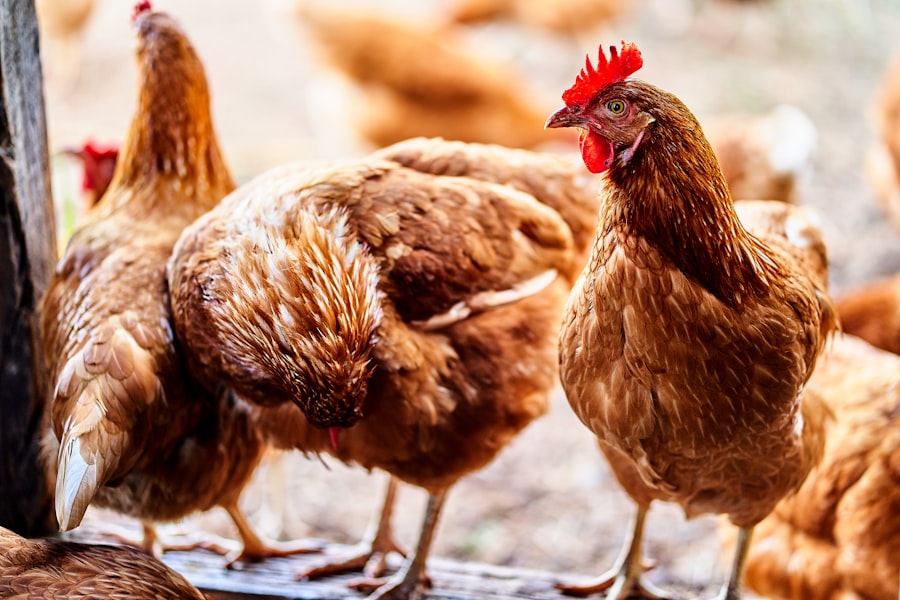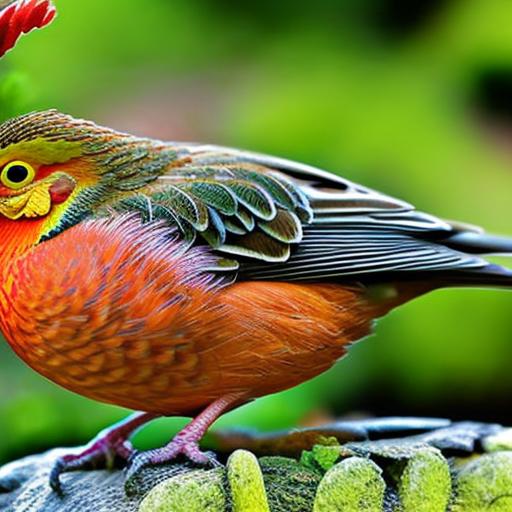Keeping chickens in a council house garden may seem like an unusual idea, but it is becoming increasingly popular among urban dwellers. Not only does it provide a sustainable source of fresh eggs, but it also offers a fun and rewarding hobby. Imagine waking up in the morning and collecting eggs from your own backyard, knowing exactly where they came from and how they were raised. In this article, we will explore the benefits of keeping chickens in a council house garden and provide tips for getting started.
Key Takeaways
- Keeping chickens in a council house garden is possible with proper understanding of rules and regulations.
- Benefits of keeping chickens include fresh eggs, natural pest control, and fertilizer for the garden.
- Choosing the right chicken coop and considering factors such as size and location is important.
- Essential features of a council house garden chicken coop include ventilation, nesting boxes, and roosting bars.
- Maintaining a clean and healthy chicken coop involves regular cleaning, providing fresh water and food, and monitoring for signs of illness.
Understanding Council House Rules and Regulations for Keeping Chickens
Before embarking on your chicken-keeping journey, it is important to familiarize yourself with the rules and regulations set by your local council. Each council may have different guidelines regarding the number of chickens allowed, coop size and placement, noise restrictions, and other factors. It is crucial to follow these rules to avoid any legal issues or complaints from neighbors.
To find out the specific rules in your area, you can visit your local council’s website or contact them directly. They will be able to provide you with the necessary information and guidance to ensure that you are in compliance with their regulations. Additionally, there are online resources and forums where you can connect with other chicken keepers in your area who can share their experiences and knowledge.
Benefits of Keeping Chickens in Your Council House Garden
One of the main benefits of keeping chickens in a council house garden is having a sustainable source of fresh eggs. Store-bought eggs often come from chickens that are raised in cramped conditions and fed a diet of antibiotics and hormones. By raising your own chickens, you have control over their diet and living conditions, ensuring that they are healthy and happy. The eggs they produce will be free-range, organic, and packed with nutrients.
In addition to the nutritional benefits, keeping chickens can also be a rewarding hobby. Chickens are social animals and can provide companionship and entertainment. Watching them scratch and peck in the garden, or hearing their gentle clucking, can be a calming and enjoyable experience. It is also a great way to teach children about responsibility and the importance of caring for animals.
Choosing the Right Chicken Coop for Your Council House Garden
Choosing the right chicken coop is essential for the well-being of your chickens and to comply with council house regulations. The coop should provide enough space for your chickens to move around comfortably, as well as protection from predators and the elements. It should also be easy to clean and maintain.
When selecting a coop, consider the size of your garden and the number of chickens you plan to keep. The coop should have enough room for each chicken to have at least 4 square feet of space. It should also have a secure run attached where the chickens can exercise and forage.
Factors to Consider When Building a Chicken Coop in Your Council House Garden
If you decide to build your own chicken coop, there are several factors to consider. First, think about the size and location of the coop. It should be placed in an area that is well-drained and receives plenty of sunlight. The coop should also be elevated off the ground to prevent dampness and provide better ventilation.
Next, consider the materials you will use for construction. Wood is a popular choice due to its durability and natural insulation properties. Make sure to use non-toxic materials that are safe for your chickens.
If you prefer not to build your own coop, there are many pre-made options available for purchase. These coops often come with all the necessary features, such as nesting boxes, roosting bars, and ventilation.
Essential Features of a Council House Garden Chicken Coop

A well-designed chicken coop should have several essential features to ensure the comfort and safety of your chickens. One important feature is proper ventilation. Good airflow is crucial to prevent the buildup of moisture and ammonia, which can lead to respiratory issues for your chickens. The coop should have windows or vents that can be opened and closed as needed.
Another essential feature is nesting boxes. These are where your chickens will lay their eggs, so they should be dark, quiet, and comfortable. Each chicken should have its own nesting box, which should be filled with clean straw or wood shavings.
Additionally, the coop should have roosting bars where your chickens can perch at night. These bars should be at least 2 inches wide and placed higher than the nesting boxes to encourage your chickens to sleep there.
Tips for Maintaining a Clean and Healthy Chicken Coop in Your Council House Garden
Maintaining a clean and healthy coop is essential for the well-being of your chickens. Regular cleaning helps prevent the buildup of bacteria and parasites that can cause diseases. Here are some tips for keeping your coop clean:
1. Remove droppings daily: Scoop out any droppings from the coop and run area daily to prevent the spread of bacteria.
2. Change bedding regularly: Replace the bedding in the nesting boxes and coop floor every few weeks or as needed. This will help keep the coop clean and odor-free.
3. Provide dust baths: Chickens love to take dust baths to keep their feathers clean and free from parasites. Provide a designated area in the coop or run where they can do this.
4. Keep food and water clean: Regularly clean and refill your chickens’ food and water containers to prevent contamination.
Feeding and Caring for Your Chickens in Your Council House Garden
Feeding and caring for your chickens is relatively simple, but it is important to provide them with a balanced diet and proper care to keep them healthy and happy. Here are some basic guidelines:
1. Feed a balanced diet: Chickens require a diet that is high in protein, vitamins, and minerals. You can purchase commercial chicken feed or create your own mix using grains, seeds, and vegetables. It is also important to provide them with access to fresh water at all times.
2. Provide enrichment: Chickens are curious animals and enjoy pecking and scratching. Provide them with toys, such as hanging treats or a dust bath area, to keep them entertained.
3. Monitor their health: Regularly check your chickens for signs of illness or injury. Look for changes in behavior, appetite, or appearance. If you notice anything unusual, consult a veterinarian who specializes in poultry.
4. Protect them from predators: Make sure your coop and run are secure to prevent predators from getting in. This includes burying wire mesh around the perimeter to deter digging animals and ensuring that the coop is locked at night.
Common Challenges of Keeping Chickens in a Council House Garden and How to Overcome Them
Keeping chickens in a council house garden can come with its own set of challenges. Here are some common challenges and tips for overcoming them:
1. Predators: Predators such as foxes, rats, and birds of prey can pose a threat to your chickens. Make sure your coop and run are secure with sturdy fencing and wire mesh. Consider installing motion-activated lights or a predator deterrent system.
2. Noise complaints: Chickens can be noisy, especially when they are laying eggs or feeling threatened. To minimize noise complaints from neighbors, choose quieter breeds and provide plenty of space for your chickens to roam.
3. Odor control: Proper cleaning and maintenance of the coop will help control odors. Regularly remove droppings and replace bedding to keep the coop clean and fresh.
4. Winter care: In colder climates, it is important to provide extra insulation and heat sources during the winter months. Make sure the coop is draft-free and provide bedding for added warmth. Consider using a heat lamp or heated water dish to prevent freezing.
Enjoying Fresh Eggs and the Joys of Raising Chickens in Your Council House Garden
Keeping chickens in a council house garden can be a rewarding and enjoyable experience. Not only do you get to enjoy fresh eggs from your own backyard, but you also have the opportunity to connect with nature and learn about sustainable living. By following council house rules and regulations, choosing the right coop, and providing proper care, you can create a safe and comfortable environment for your chickens. So why not give it a try and enjoy the rewards of fresh eggs and a fun hobby?
If you’re considering keeping chickens in your council house garden, you may also be interested in learning about the process of hatching chicken eggs naturally. Understanding how long it takes for chicken eggs to hatch can be crucial for successful breeding. To delve deeper into this topic, check out this informative article on Poultry Wizard. Additionally, if you’re thinking about expanding your poultry collection to include ducks, it’s important to know when duck mating season occurs. Discover more about this fascinating aspect of duck breeding by reading the article on Poultry Wizard. Lastly, ensuring that your ducks receive proper nutrition is essential for their health and well-being. Learn about what you should feed ducks to keep them happy and thriving in this comprehensive guide on Poultry Wizard.
FAQs
Can I keep chickens in my council house garden?
Yes, you can keep chickens in your council house garden, but you need to follow certain rules and regulations.
What are the rules and regulations for keeping chickens in a council house garden?
The rules and regulations for keeping chickens in a council house garden vary depending on the council. You need to check with your local council to find out what rules and regulations apply in your area.
How many chickens can I keep in my council house garden?
The number of chickens you can keep in your council house garden depends on the size of your garden and the rules and regulations of your local council. Generally, you can keep up to six chickens in a standard-sized garden.
Do I need planning permission to keep chickens in my council house garden?
No, you do not need planning permission to keep chickens in your council house garden, but you need to follow the rules and regulations of your local council.
Do I need to register my chickens with the council?
Some councils require you to register your chickens, while others do not. You need to check with your local council to find out if you need to register your chickens.
What do I need to provide for my chickens?
You need to provide your chickens with a secure coop and run, food and water, and a suitable area for them to roam and scratch. You also need to clean their coop and run regularly to keep them healthy.
Meet Walter, the feathered-friend fanatic of Florida! Nestled in the sunshine state, Walter struts through life with his feathered companions, clucking his way to happiness. With a coop that’s fancier than a five-star hotel, he’s the Don Juan of the chicken world. When he’s not teaching his hens to do the cha-cha, you’ll find him in a heated debate with his prized rooster, Sir Clucks-a-Lot. Walter’s poultry passion is no yolk; he’s the sunny-side-up guy you never knew you needed in your flock of friends!







